A story that has swung between the high drama of political calculation, resignations and rivalries and the dry detail of fishing quotas and state aid rules is over – for now.
The Brexit fallout is yet to be seen and negotiations will continue to flesh out a skeleton deal struck on Christmas Eve, but the United Kingdom has left the European Union and its rules, putting the cork in the bottle of a row that has engulfed the country for almost five decades.
04:58
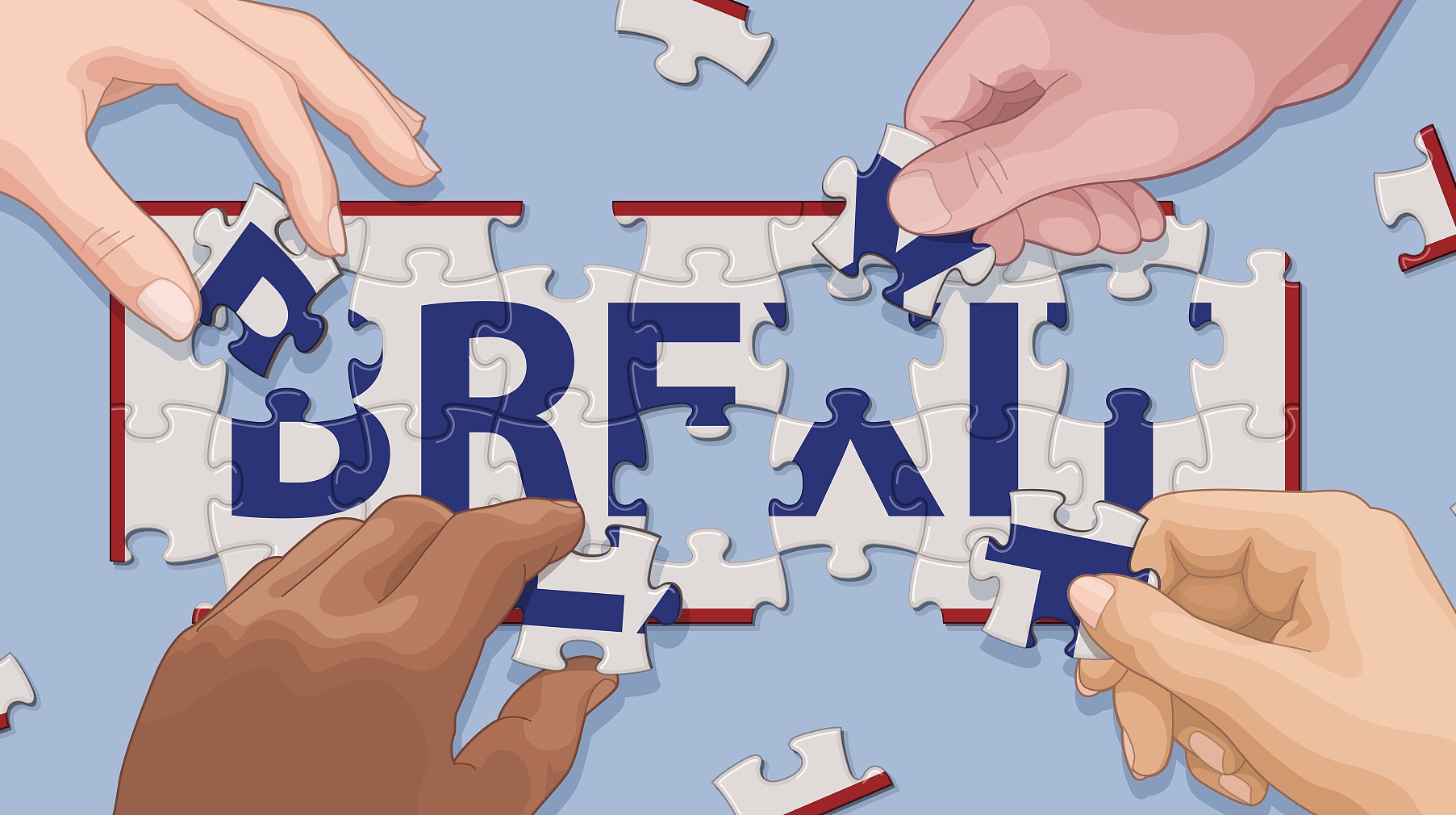
A long time coming
There have been calls for Britain to leave the European Economic Community, as it was then, almost since it joined in 1973 under the stewardship of Conservative Prime Minister Ted Heath. A referendum followed just two years later that was decisively won by those wanting to remain part of what was then a far more limited bloc.
Margaret Thatcher, then a Conservative MP, campaigned to stay in and later as prime minister played a key role in shaping the single market, but over time she became skeptical of overreach – a trend reflected in much of the British media, which delighted in lampooning Brussels while warning of a coming "European superstate."
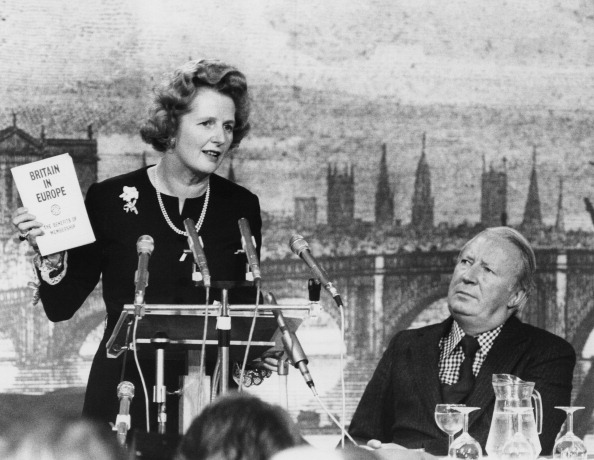
Conservative leader Margaret Thatcher speaks at a meeting of the party's campaign to keep Britain in the Common Market, watched by her predecessor Ted Heath, May 17, 1975. /Getty
Conservative leader Margaret Thatcher speaks at a meeting of the party's campaign to keep Britain in the Common Market, watched by her predecessor Ted Heath, May 17, 1975. /Getty
A sizable number of Britons regarded the union as purely economic, particularly among Conservatives, whereas the European core saw it as a political mechanism to hold together a continent riven by war in the first half of the 20th century.
That central tension grew as the decades passed, more countries were admitted, the euro was adopted and the EU pursued a policy of "ever closer union."
The Cameron gamble
By 2013, decades of rancor over issues as important as immigration and euromyths as trivial as the shape of bananas-shaped conditions in the UK for what came to be known as David Cameron's "Bloomberg speech."
Cameron, then prime minister in a coalition government, told an audience at the media company that if his Conservative Party was elected in 2015 he would renegotiate the UK's role in the EU, after which a simple in/out public vote on EU membership would be held to allow the British people to give their verdict.
"It is time for the British people to have their say," he said. "It is time for us to settle this European question in British politics."
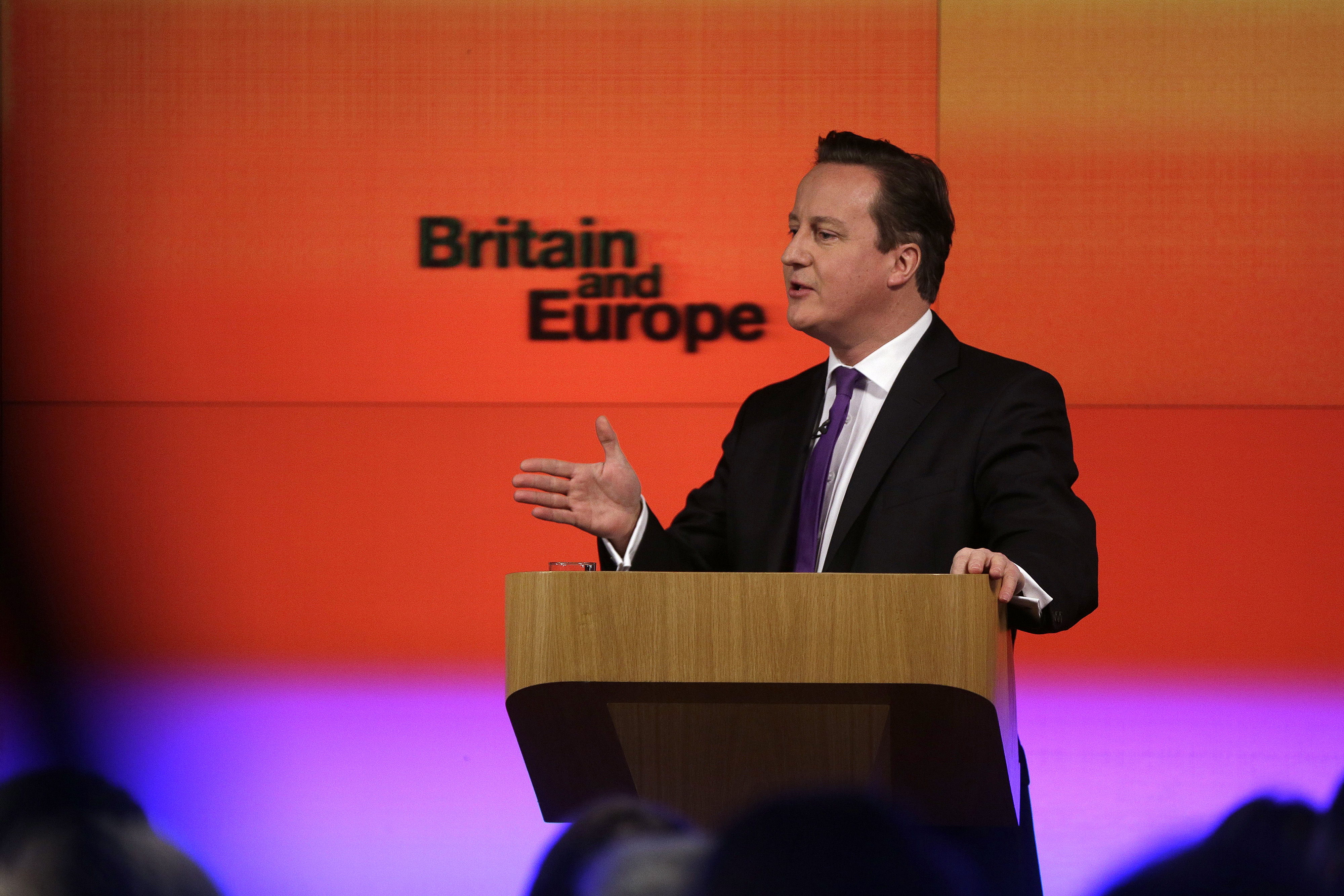
UK Prime Minister David Cameron delivers a speech on Europe at the Bloomberg offices in London, UK, January 23, 2013. /Getty
UK Prime Minister David Cameron delivers a speech on Europe at the Bloomberg offices in London, UK, January 23, 2013. /Getty
It was a gambit aimed at calming right-wing critics within his own party and dragging voters back from the UK Independence Party, which was steadily growing in popularity under Nigel Farage, that was never intended to lead to Brexit.
Cameron was leading a coalition government with the pro-EU Liberal Democrats and polls suggested he would likely need to form another to stay in power – a perfect excuse to ditch the referendum promise.
But it didn't work out that way. Cameron's Conservatives shocked pollsters and commentators to win a majority in 2015 with a resolutely negative campaign – and that victory paved the way for a referendum and the prime minister's downfall.
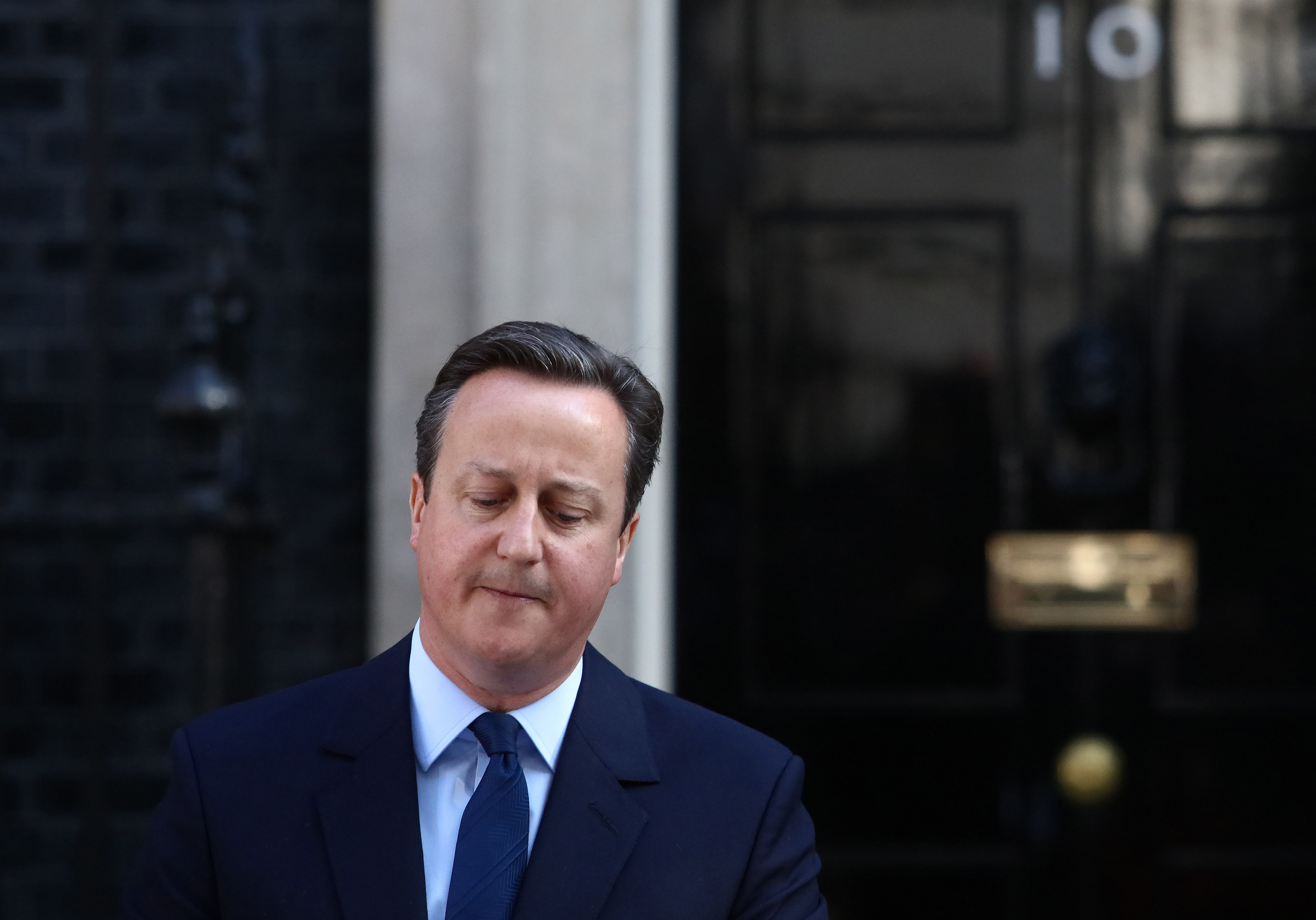
David Cameron pauses as he makes his resignation speech in Downing Street following the EU referendum vote, London, UK, June 24, 2016. /Getty
David Cameron pauses as he makes his resignation speech in Downing Street following the EU referendum vote, London, UK, June 24, 2016. /Getty
Boris Johnson and Vote Leave lined up against Cameron and most of the British establishment, and on June 23 they caused an upset which shocked the world.
Their "take back control" message resonated, and Britain narrowly voted to leave the EU. The next day, Cameron announced the end of his political career.
The May misjudgment
Next came a sometimes shambolic battle to lead Briton out of the EU.
Johnson withdrew his candidacy after his own campaign manager, Michael Gove, stood against him, and ultimately, Theresa May, who quietly campaigned to remain in the bloc, won the contest to lead the Conservatives and the country.
"Brexit means Brexit, and we're going to make a success of it," she said during her leadership campaign, with a lack of specificity that became familiar.
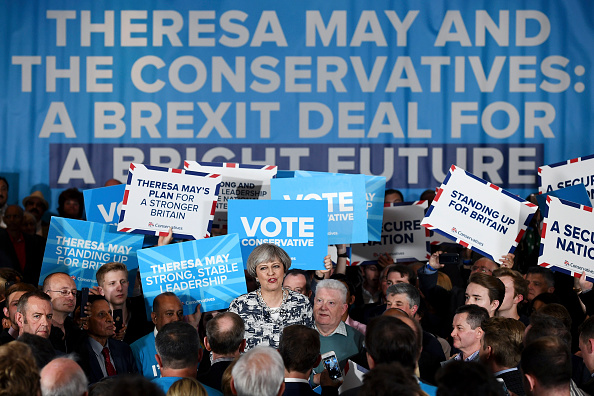
Prime Minister Theresa May speaks during an election campaign visit, Solihull, UK, June 7, 2017. /Getty
Prime Minister Theresa May speaks during an election campaign visit, Solihull, UK, June 7, 2017. /Getty
Fast-forward to June 2017 and a decision that defined the May premiership.
Faced with a weak opposition and riding high in the polls, she called a snap election she hoped would give her a decisive mandate to pursue her moderate vision of Brexit.
May kept her job but lost the Conservative majority, relying on small Northern Irish party the Democratic Unionists to pass votes – an outcome which came back to haunt her time and time again as she attempted to deliver Brexit.
As talks progressed the over-simplicity of the slogans and the "in or out" option were exposed: from the future of Northern Ireland to access to the single market, the issues at stake were hugely complex and many were barely debated in the referendum campaign.
There was no consensus within May's party let alone the country, and in the EU different groups of member states had their own priorities.
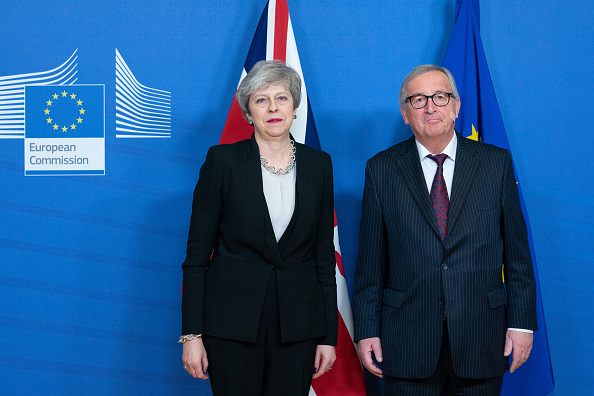
UK Prime Minister Theresa May and Jean-Claude Juncker, president of the European Commission, stand for a photo ahead of talks in Brussels, Belgium, February 20, 2019. /Getty
UK Prime Minister Theresa May and Jean-Claude Juncker, president of the European Commission, stand for a photo ahead of talks in Brussels, Belgium, February 20, 2019. /Getty
But by mid-2018, May looked to have made progress in talks with EU negotiator Michel Barnier and Jean-Claude Juncker, president of the European Commission. An outline deal was agreed and backed May's cabinet, but opposition from within her own Conservative Party grew.
Two days after agreeing to the deal, Brexit Secretary David Davis resigned. The next day Boris Johnson quit as foreign secretary, claiming in his resignation letter that under May's plan the UK was headed "for the status of a colony."
By November, May again had cabinet approval for her withdrawal plan. Twenty-four hours on, new Brexit Secretary Dominic Raab quit and was followed out the door by Work and Pensions Secretary Esther McVey.
A month later May saw off an attempt by her party to remove her.
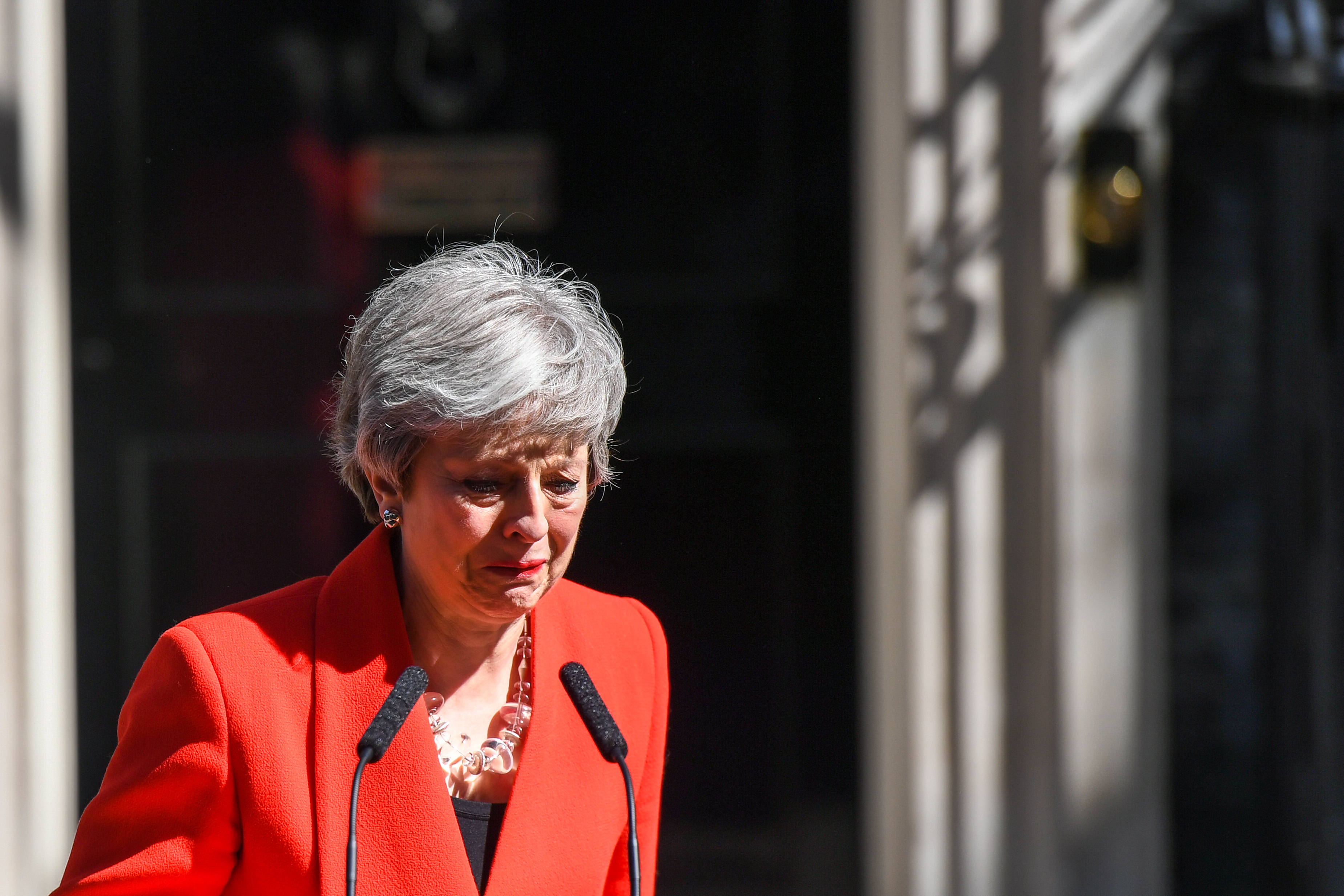
British Prime Minister Theresa May announces she will step down in a statement from Downing Street, London, UK, May 24, 2019. /Getty
British Prime Minister Theresa May announces she will step down in a statement from Downing Street, London, UK, May 24, 2019. /Getty
Weakened, but with an agreement backed by her cabinet and the 27 other EU leaders, May fought on. Fresh humiliation awaited in 2019.
In January her deal to leave the EU was rejected by a huge margin in the British parliament. Two months later it was voted down a second time, and May was forced to ask for a short extension to the March 29 Brexit deadline.
"Two years on, MPs have been unable to agree on a way to implement the UK's withdrawal," she said. "As a result we will now not leave on time with a deal on the March 29. This delay is a matter of great personal regret for me."
Her deal was rejected again, and in April Brexit was delayed to October 31, 2019. By May, the prime minister conceded defeat and announced her resignation.
The Johnson deal
With a sense of inevitably and as the country tired of Brexit, Boris Johnson stood again for the Conservative leadership and triumphed.
After two years of caution from May, the new prime minister caused controversy from the outset: attempting to prorogue parliament before culling his party of high profile skeptics and trying – and failing – to force an early election.
"We are getting ready to come out on October 31," Johnson told Talk Radio on June 25, 2019. " Do or die. Come what may." It was one of many attempts to ramp up pressure on the EU and in October, he announced an agreement.
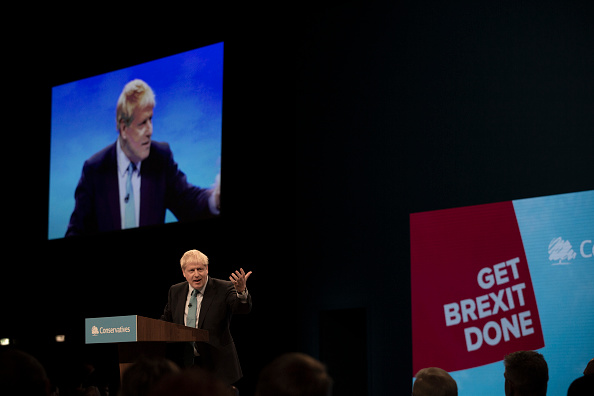
UK Prime Minister Boris Johnson delivers his keynote speech to the annual Conservative Party conference in Manchester, UK, October 2, 2019. /Getty
UK Prime Minister Boris Johnson delivers his keynote speech to the annual Conservative Party conference in Manchester, UK, October 2, 2019. /Getty
However, Johnson was frustrated by parliament and by the end of the month he’d agreed to again extend the Brexit deadline and received support to hold a general election.
His campaign to "get Brexit done" secured a huge majority and by January the new House of Commons had passed his bill to withdraw the UK from the European Union.
"The signing of the Withdrawal Agreement is a fantastic moment, which finally delivers the result of the 2016 referendum and brings to an end far too many years of argument and division," Johnson said.
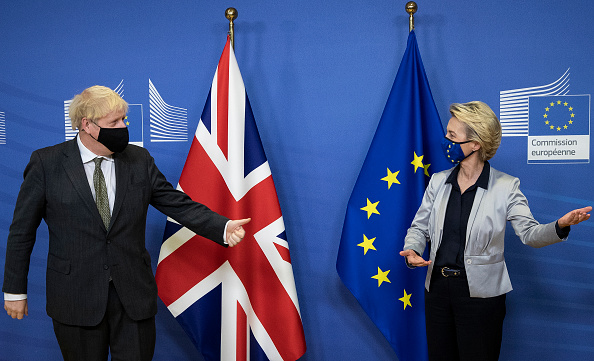
Prime Minister Boris Johnson and European Commission President Ursula von der Leyen meet to try to make a breakthrough on a post-Brexit trade deal, Brussels, Belgium, December 9, 2020. /Getty
Prime Minister Boris Johnson and European Commission President Ursula von der Leyen meet to try to make a breakthrough on a post-Brexit trade deal, Brussels, Belgium, December 9, 2020. /Getty
On January 31, 2020, Britain left the bloc and entered a transition period – starting an 11-month countdown to secure a new deal on the future UK-EU relationship just as the COVID-19 pandemic was spreading around the world.
Johnson continued to play hardball in public, refusing to extend the transition period and by October saying he was ending talks on a trade deal. However, negotiations resumed and by December three key sticking points remained: a level-playing field to avoid unfair competition, access to British fishing waters and a dispute-settlement mechanism.
Threats, posturing and frantic discussions followed – but finally, after European Commission President Ursula von der Leyen and Johnson took control of negotiations, a deal was announced on Christmas Eve.
"This is an amazing moment for this country," Johnson said in his New Year message. "We have our freedom in our hands and it is up to us to make the most of it."
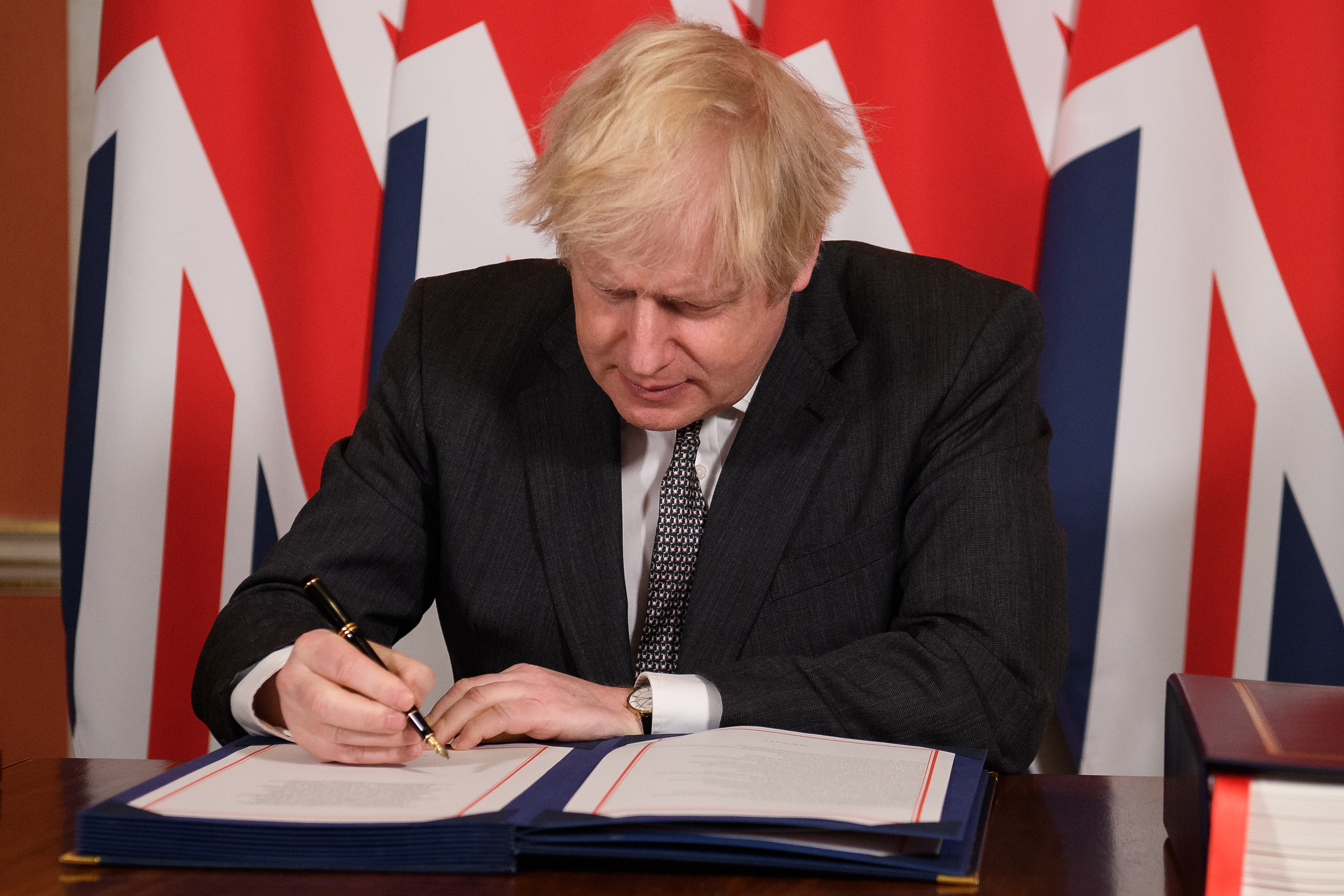
UK Prime Minister, Boris Johnson signs a page of the Brexit trade deal with the EU in Number 10 Downing Street, London, UK, December 30, 2020. /Getty
UK Prime Minister, Boris Johnson signs a page of the Brexit trade deal with the EU in Number 10 Downing Street, London, UK, December 30, 2020. /Getty
The agreement is only a foundation – services, which make up about 80 percent of the British economy, barely register – so negotiations between the UK and EU will go on.
The fallout from Brexit – for good or bad – will continue for years to come as the economic impact is weighed and the four nations of the UK consider their futures.
But for now at least, the UK and EU are moving in new, and separate, directions.
Video by Wang Zengzheng

